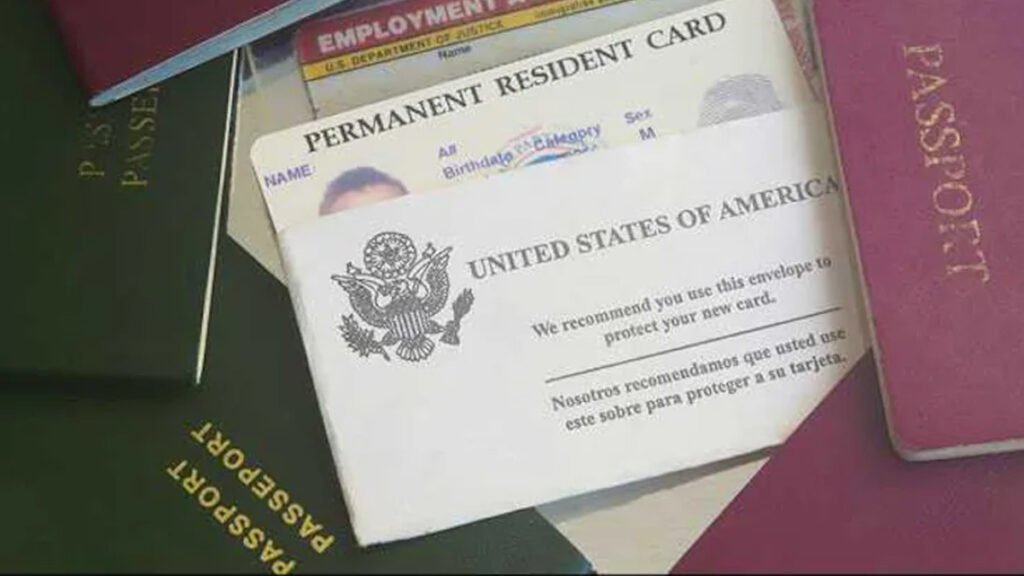Donald Trump’s administration has proposed a controversial new immigration policy requiring green card holders to disclose their social media accounts to the U.S. government. This move is part of a broader initiative aimed at intensifying immigration enforcement. While visa applicants abroad already face this requirement, the new proposal extends it to individuals residing legally in the United States. This policy raises questions about privacy, political expression, and its potential impact on the Indian immigrant community.
What Are Green Cards and Why Are They Important?
A green card grants lawful permanent residency in the U.S., allowing immigrants to live and work indefinitely. It is often a stepping stone to U.S. citizenship. Green card holders enjoy most of the rights of citizens, though they must still comply with certain immigration laws and renew their status periodically.
Trump’s New Social Media Policy: What You Need to Know
The latest immigration proposal mandates that all green card applicants and holders submit their social media handles for review. This extends the current requirement imposed on visa applicants to those already legally residing in the U.S. The stated aim is to enhance identity verification and national security screening.
Why Is This Policy Being Implemented?
According to an official notice released on March 5, the administration believes social media monitoring will help verify identities, detect potential security threats, and bolster national security. The U.S. Citizenship and Immigration Services (USCIS) asserts that this measure will provide a more thorough vetting process for permanent residency applicants.
How Will Green Card Holders Be Affected?
This policy places additional scrutiny on legal residents, including Indian green card holders. Many fear it could discourage political discourse and violate personal privacy rights. The policy could also make it easier for the government to deny applications based on controversial social media activity.
Impact on the Indian Immigrant Community
Indian immigrants form a significant portion of U.S. green card holders. Many work in tech, healthcare, and finance, contributing to the American economy. The fear of political persecution or visa rejection could lead many to self-censor their online activities.
Concerns About Privacy and Free Speech
Privacy advocates argue that requiring immigrants to disclose their social media accounts is an invasion of personal freedom. Legal experts caution that this could set a dangerous precedent, making it easier for the government to target individuals based on political beliefs or affiliations.
Could This Policy Lead to Deportation?
While the administration claims the policy aims at national security, some worry it could be weaponized to deport individuals based on their online presence. Any content deemed controversial by immigration officials could be grounds for denial or revocation of permanent residency.
Comparisons with Past Immigration Policies
Past administrations have implemented various vetting measures, but Trump’s approach is one of the most stringent. Similar proposals were discussed during his first term, but this expansion directly affects green card holders, making it unprecedented.
Legal Challenges Against the Policy
Civil rights groups are expected to challenge this policy in court. They argue that it violates constitutional protections, including freedom of speech and due process. Previous legal battles have delayed or overturned similar policies in the past.
How Social Media Monitoring Works
Government agencies use AI and data analytics to scan for potentially harmful content. Posts that include politically sensitive topics, affiliations with certain organizations, or controversial statements could be flagged for further investigation.
What Can Green Card Holders Do to Protect Themselves?
Legal experts recommend:
- Reviewing past social media posts for potentially problematic content.
- Using privacy settings to restrict public visibility of profiles.
- Consulting with an immigration attorney if concerned about past or current online activity.
The Political Debate Over Immigration Crackdowns
Trump’s approach to immigration has always been a contentious issue. Supporters argue that strict vetting is necessary for national security, while opponents see it as an overreach that disproportionately affects minorities and legal immigrants.
How This Affects Future Green Card Applicants
Prospective applicants must now consider their social media history before applying. The policy could lead to longer processing times and increased denials based on subjective interpretations of online activity.
International Reactions to the Policy
India’s government has yet to formally respond, but the policy could affect diplomatic relations. Many Indian officials advocate for fair treatment of Indian immigrants who contribute significantly to the U.S. economy.
Could This Policy Expand Further?
If implemented successfully, social media screening could extend to other visa categories, affecting students, temporary workers, and tourists.
Trump’s Broader Immigration Strategy
This policy aligns with Trump’s broader goal of tightening immigration controls. Other measures include increased deportations, stricter visa requirements, and heightened border security.
Is There Precedent for Such a Policy?
While social media monitoring has been used in national security cases, applying it universally to green card holders is unprecedented. The closest comparison is the vetting of refugee applicants.
What Are the Possible Next Steps?
The policy is currently under review and open to public comment. Advocacy groups are urging immigrants to voice their concerns before it becomes law.
Conclusion
Trump’s new social media policy for green card holders is a significant shift in immigration enforcement. While aimed at national security, it raises concerns about privacy, political freedom, and legal discrimination. As the debate unfolds, it is crucial for green card holders to stay informed and seek legal advice if needed. The future of immigration policies remains uncertain, but this proposal signals a tougher stance on residency and citizenship applications.

